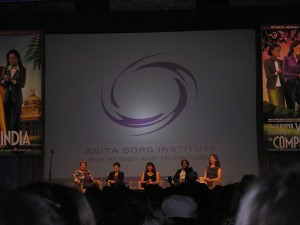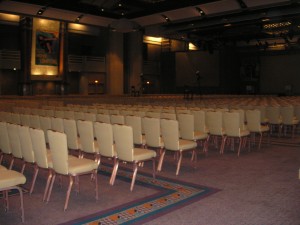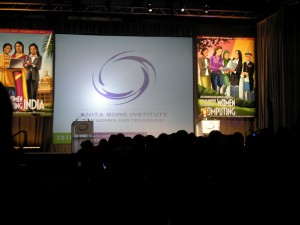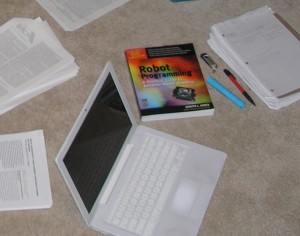More advice!
I collected a lot of good advice from the women at the Grace Hopper Celebration of Women in Computing, which I recently attended. I shared what they had to say about undergrads looking ahead to grad school.
This is Part II: applicable to everyone! A lot of it comes from the Imposter Plenary Panel. Those women had good things to say!

-
One of the women on the Imposter Plenary Panel, Fran Berman, emphasized confidence. When you get the opportunity to sit at a table with the most important people in your company or in your field, is sitting there a right, or a privilege? "You'll do best in that room if you think you have a right to be there," said Fran. She said it's a tightrope between who you believe yourself to be and who you want to be in that situation.
-
Yolanda Rankin, another of the women on the Imposter Plenary Panel, said the crux of managing situations is managing relationships with people.
-
Diane Gonzelez, another of the imposter panelists, explained her "Don't ask, don't get" policy. You have to tell people what you want, she said. If you want a promotion, your manager may pass you up until s/he knows you're looking for a promotion. This doesn't just apply to the job market, either. Diane shared a quote from Althea Gibson: "No matter what accomplishments you make, somebody helped you."
-
Fran Berman agreed with Diane Gonzalez: "there is no recognition fairy" who'll come along and give you an award. You must advocate for yourself and your career.
-
From the "How do I become a Researcher?" session: You have more control in academia than you do in industry. In general, anyway, because in industry, divisions get outsourced, proposals and ideas get turned down, and companies get reorganized. Unless you're the one in charge, you don't get as much self-determination.
-
Diane Gonzelez said she has observed a tendency among women: There's a job with ten requirements. A man may look at it, see he has two of the requirements, and apply, claiming that he can do all ten. A woman may have eight, but think, oh gosh, I'm not qualified, I shouldn't apply! Her advice: Don't doubt yourself so much.
-
Fran Berman talked about mistakes. She said, when you make a mistake, "You have to learn from it and don't repeat it... right away."








